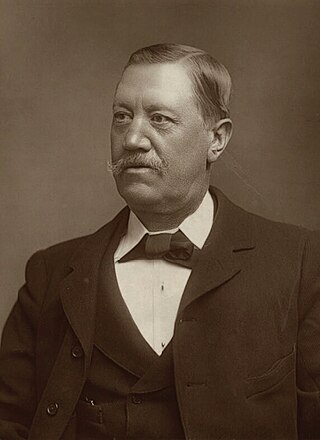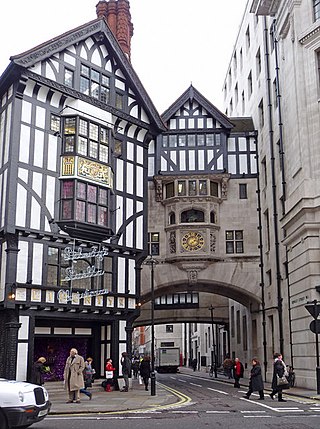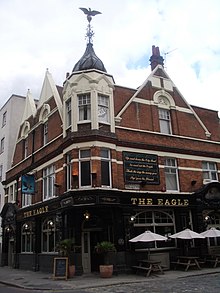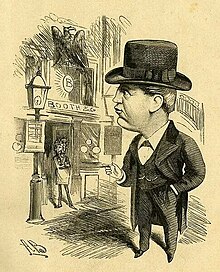
Hoxton is an area in the London Borough of Hackney, England. It was historically in the county of Middlesex until 1889. Hoxton lies north-east of the City of London and is considered to be a part of London East End and was once part of the civil parish and subsequent Metropolitan Borough of Shoreditch, prior to its incorporation into Hackney.

Shoreditch is an area in London, England and is located in the London Borough of Hackney alongside neighbouring parts of Tower Hamlets, which are also perceived as part of the area due to historic ecclesiastical links. Shoreditch lies just north-east of the border with the City of London and is considered to be a part of London's East End.

Music hall is a type of British theatrical entertainment that was most popular from the early Victorian era, beginning around 1850, through the Great War. It faded away after 1918 as the halls rebranded their entertainment as variety. Perceptions of a distinction in Britain between bold and scandalous music hall entertainment and subsequent, more respectable variety entertainment differ. Music hall involved a mixture of popular songs, comedy, speciality acts, and variety entertainment. The term is derived from a type of theatre or venue in which such entertainment took place. In North America vaudeville was in some ways analogous to British music hall, featuring rousing songs and comic acts.

City Road or The City Road is a road that runs through central London. The northwestern extremity of the road is at Angel where it forms a continuation of Pentonville Road. Pentonville Road itself is the modern name for the eastern part of London's first bypass, the New Road from Paddington to Islington, which was constructed in 1756. The City Road was built in 1761 as a continuation of that route to the City of London.

Old Street is a 1-mile (1.6 km) street in inner north-east Central London, England that runs west to east from Goswell Road in Clerkenwell, in the London Borough of Islington, via St Luke's and Old Street Roundabout, to the crossroads where it meets Shoreditch High Street (south), Kingsland Road (north) and Hackney Road (east) in Shoreditch in the London Borough of Hackney.

The Strand is a major street in the City of Westminster, Central London. The street, which is part of London's West End theatreland, runs just over 3⁄4 mile (1.2 km) from Trafalgar Square eastwards to Temple Bar, where it becomes Fleet Street in the City of London, and is part of the A4, a main road running west from inner London.
"Pop! Goes the Weasel" is a traditional English and American song, a country dance, nursery rhyme, and singing game that emerged in the mid-19th century. It is commonly used in jack-in-the-box toys and for ice cream trucks.

Bishopsgate was one of the eastern gates in London's former defensive wall. The gate's name is traditionally attributed to Earconwald, who was Bishop of London in the 7th century. It was first built in Roman times and marked the beginning of Ermine Street, the ancient road running from London to York (Eboracum). The gate was rebuilt twice in the 15th and 18th centuries, but was permanently demolished in 1760.

Coventry Street is a short street in the West End of London, connecting Piccadilly Circus to Leicester Square. Part of the street is a section of the A4, a major road through London. It is named after the politician Henry Coventry, secretary of state to Charles II.

St Martin Orgar was a church in the City of London in Martin Lane, off Cannon Street. Its name is said to derive from one Ordgarus, a Dane who donated the church to the canons of St Paul’s.

St Leonard's, Shoreditch, is the old parish church of Shoreditch, often known simply as Shoreditch Church. It is located at the intersection of Shoreditch High Street with Hackney Road, within the London Borough of Hackney in East London. The current building dates from about 1740 and is Grade I listed. The church is mentioned in the line ""When I grow rich", say the bells of Shoreditch" from the nursery rhyme Oranges and Lemons.

Spinner's weasel or clock reel is a mechanical yarn-measuring device consisting of a spoked wheel with gears attached to a pointer on a marked face and an internal mechanism that makes a "pop" sound after the desired length of yarn is measured. The pointer allows the spinner to see how close they are to reaching a skein. The weasel's gear ratio is typically 40 to 1, and the circumference of the reel is usually two yards, thus producing an 80-yard skein when the weasel pops.

Conduit Street is a street in Mayfair, London. It connects Bond Street to Regent Street.
Benjamin Conquest, born Benjamin Oliver, was the manager of the Garrick and Grecian Theatres.

George Augustus Oliver Conquest was a playwright, theatrical manager, acrobat and pantomimist described as "the most stunning actor-acrobat of his time".

Devereux Court, a street in the City of Westminster located just south of the Strand and east of Essex Street, is completely pedestrianised. This narrow lane is lined with well-preserved seventeenth-century buildings. The court's distinctive dog-leg layout has remained unchanged since its establishment in the 1670s on the grounds of Essex House, a stately home renowned for its expansive gardens.

Kingly Street is a street in London's Soho district. It runs north to south from Liberty's and Foubert's Place to Beak Street, in parallel to, and between, Regent Street and Carnaby Street.
Charles Sloman was an English comic entertainer, singer and songwriter, as well as a composer of ballads and sacred music. He was billed as "the only English Improvisatore".
The phrase "that's the way the money goes", or "how the money goes", is used to draw attention to profligacy and waste of the public purse, church funds etc., or just the day to day cost of living. It can be found in texts going back to 1707. Around the 1840s it was sometimes enclosed in quotation marks referencing popular songs and rhymes that contained the line.

















